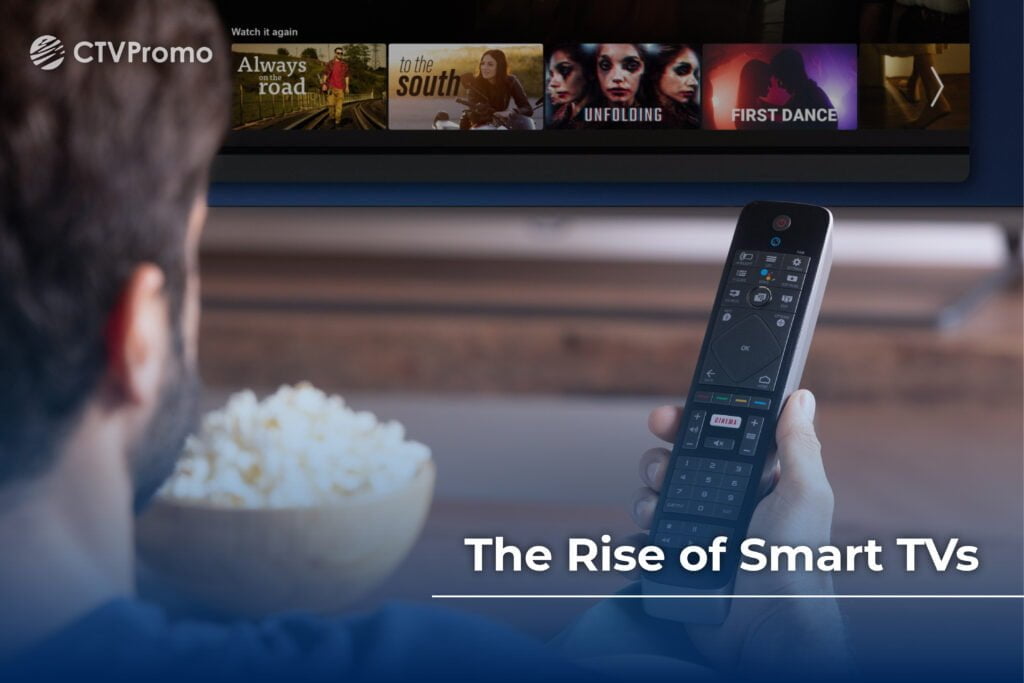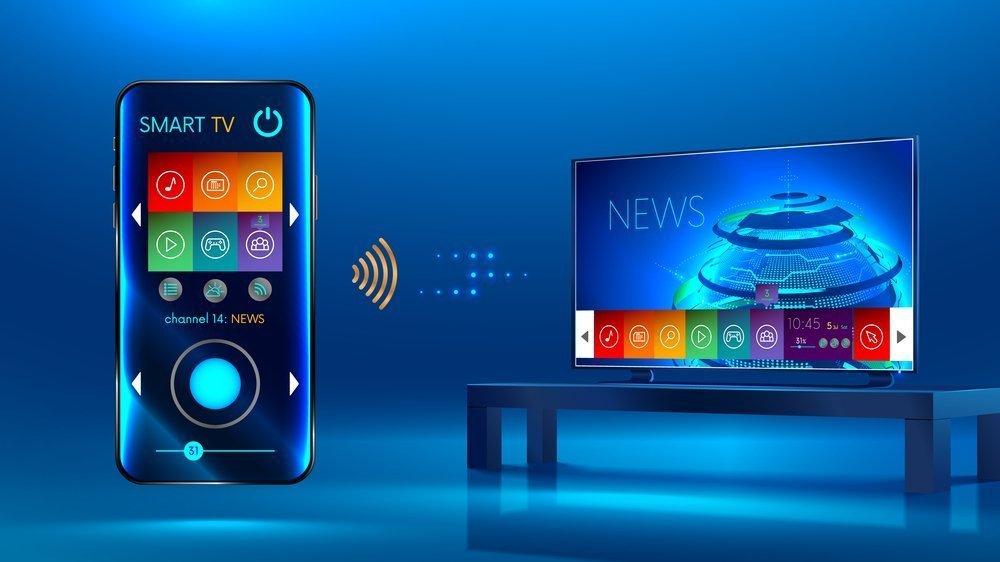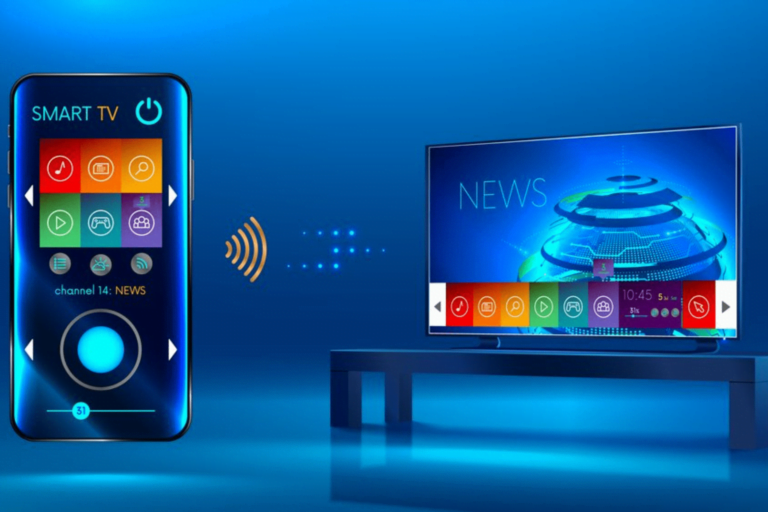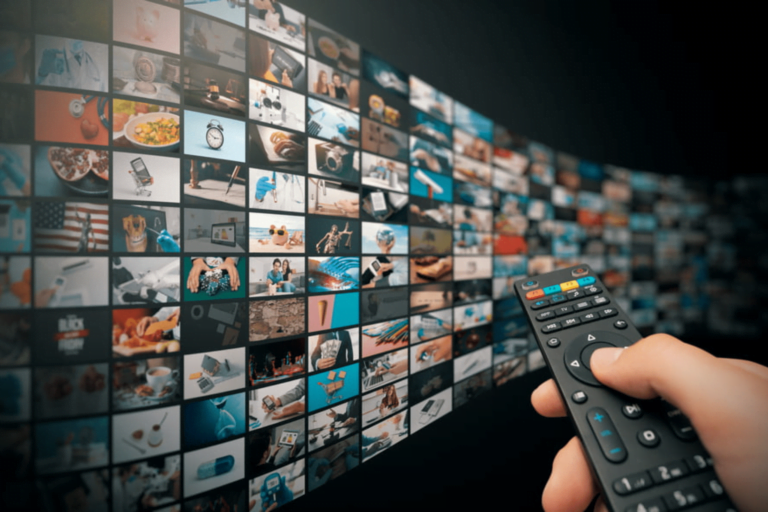On This Page
The Rise of Smart TVs: Transforming the Way We Watch Television
Home » Blog » The Rise of Smart TVs: Transforming the Way We Watch Television

The television industry has undergone a remarkable transformation over the years, with the introduction of smart TVs revolutionizing the way we watch our favorite shows and movies.
Gone are the days of limited channels and scheduled programming; smart TVs have opened up a world of possibilities and endless entertainment options.
In this blog, we will explore the rise of smart TVs and how they have transformed the way we consume television content.
What are Smart TVs?
Smart TVs, also known as connected TVs, are televisions equipped with integrated internet capabilities and advanced features that go beyond traditional broadcasting.
These devices have become increasingly popular due to their ability to provide a seamless viewing experience by combining the functions of a TV and a computer. With a smart TV, users can access a wide range of streaming services, browse the web, and interact with various applications, all from the comfort of their living rooms.
Smart TVs have come a long way since their inception, with significant advancements in display technology, user interfaces, and content accessibility.
Key Features of Smart TVs
Let’s dig deeper into the characteristics of Smart TVs to understand them better.
Internet Connectivity
Smart TVs come with built-in Wi-Fi or Ethernet ports, enabling seamless internet connectivity. This feature allows users browse the web, stream content, and access online services directly from their TVs.
App Availability
Smart TVs have their own dedicated app stores, offering a wide selection of applications for entertainment, productivity, and utility purposes. Users can install apps like YouTube, Spotify, or even video games to enhance their TV experience.
Voice Control
Many smart TVs now come with voice recognition capabilities, enabling users to control their TVs by simply speaking commands. Whether it’s searching for content, adjusting settings, or launching apps, voice control makes navigating the TV interface more intuitive and effortless.
Screen Mirroring
Smart TVs often support screen mirroring, allowing users to cast content from their smartphones, tablets, or laptops directly onto the TV screen. This feature enables seamless sharing of photos, videos, and presentations with friends and family.
Popular Smart TV Brands & Systems
Several leading manufacturers have embraced smart TV technology and introduced their own lineup of feature-rich models.
Some of the prominent brands in the smart TV market include Samsung, LG, Sony, TCL, and Vizio. Each brand offers a unique set of features, display technologies, and pricing options to cater to different consumer preferences.
Smart TV Operating Systems
Smart TVs are powered by various operating systems that govern their interface, app ecosystem, and overall user experience.
Here are a few popular operating systems used in smart TVs:
- Android TV: Developed by Google, Android TV provides a familiar and user-friendly interface. It offers access to a vast range of apps from the Google Play Store and supports Google Assistant for voice control.
Tizen: Developed by Samsung, Tizen is known for its smooth performance and intuitive interface. It offers seamless integration with other Samsung devices and supports popular streaming services.
- webOS: Developed by LG, webOS offers a sleek and responsive user interface. It provides easy navigation, quick access to apps, and supports voice control through LG’s ThinQ AI platform.
- Roku OS: Developed by Roku, Roku OS focuses on simplicity and ease of use. It offers a vast selection of streaming channels, a customizable home screen, and an intuitive remote control.
Let’s delve deeper into the benefits and features of smart TVs and understand why they have become a game-changer in the television industry.
Benefits of Smart TVs
Here are a few perks of Smart TVs that make them a convenient choice:
Enhanced Picture Quality
Smart TVs offer superior picture quality, thanks to their high-resolution displays and advanced image processing technologies. With features like 4K Ultra HD and HDR (High Dynamic Range), viewers can enjoy vivid colors, sharper details, and a more immersive visual experience.
Access to Streaming Services
One of the primary advantages of smart TVs is their seamless integration with popular streaming services such as Netflix, Amazon Prime Video, and Hulu.
Users can easily stream their favorite movies, TV shows, and documentaries directly on their TVs, eliminating the need for external devices like streaming boxes or dongles.
Integration with Other Devices
Smart TVs can be seamlessly integrated with other devices in your home entertainment ecosystem. Whether it’s connecting your gaming console, soundbar, or home theater system, smart TVs offer a centralized hub for all your entertainment needs, reducing clutter and enhancing convenience.
Smart Home Compatibility
Many smart TVs are compatible with voice assistants like Amazon Alexa or Google Assistant, allowing users to control their TV using voice commands. From changing channels to adjusting volume, voice control adds an extra layer of convenience and hands-free operation.

The Impact of Smart TVs on Content Consumption
The advent of smart TVs has had a profound impact on how we consume television content.
Let’s explore some key changes brought about by the rise of smart TVs:
On-demand Streaming
Smart TVs have played a significant role in the rise of on-demand streaming services. Platforms like Netflix, Amazon Prime Video, and Disney+ have gained immense popularity, offering a vast library of movies, TV shows, and original content.
Smart TVs provide a convenient and immersive platform to access these services directly on the big screen.
Cord-cutting Trend
The availability of streaming services on smart TVs has fueled the cord-cutting trend, where viewers are canceling traditional cable or satellite subscriptions in favor of streaming options.
Smart TVs offer a viable alternative to traditional broadcasting, allowing users to customize their content preferences and save on monthly expenses.
Personalized Recommendations
Smart TVs leverage machine learning algorithms to analyze user preferences and provide personalized content recommendations.
Whether it’s suggesting similar shows based on viewing history or tailoring the interface to individual preferences, smart TVs enhance the content discovery process and make entertainment more personalized.
Exploring The Future of Smart TVs
The evolution of smart TVs is far from over. Here are some areas where we can expect to see advancements and improvements in the future:
Advancements in Display Technology
Display technology is continuously evolving, with the introduction of technologies like MicroLED and OLED pushing the boundaries of picture quality, color accuracy, and contrast ratio.
Future smart TVs are likely to adopt these advancements, delivering even more stunning visuals.
Integration with Artificial Intelligence
Smart TVs will further integrate artificial intelligence (AI) capabilities to enhance the user experience. AI-powered features may include voice recognition advancements, intelligent content recommendations, and even automated content upscaling for non-4K content.
Enhanced User Experience
Manufacturers will focus on improving the overall user experience by making interfaces more intuitive, responsive, and user-friendly. Efforts will be made to streamline navigation, reduce input lag, and ensure seamless integration with other smart devices in the home.
Conclusion
Smart TVs have truly transformed the way we watch television, offering an unparalleled level of convenience, flexibility, and content accessibility. With enhanced picture quality, access to streaming services, integration with other devices, and smart home compatibility, smart TVs have become an essential part of modern entertainment setups.
As technology continues to advance, we can expect even more exciting features and improvements in the future, making the smart TV experience more immersive and enjoyable than ever before.
FAQs
How do I connect my Smart TV to the internet?
Connecting your smart TV to the internet can usually be done through Wi-Fi or by connecting an Ethernet cable from your router to the TV. You can find the network settings in the TV’s menu and follow the on-screen instructions to connect.
Can I use a Smart TV without an internet connection?
While smart TVs offer a wide range of features that rely on internet connectivity, you can still use them as regular TVs to watch broadcast channels or play content from external devices like DVD players or gaming consoles without an internet connection.
Can I control my Smart TV with my voice?
Many smart TVs now support voice control. Depending on the TV model and operating system, you may be able to control your TV using voice commands through the TV’s remote control or a compatible voice assistant device.
Are Smart TVs compatible with other smart devices?
Yes, smart TVs are often compatible with other smart devices in your home ecosystem. You can connect them to smart speakers, home automation systems, or even your smartphone, allowing for seamless control and integration.
Can I install additional apps on a Smart TV?
Most smart TVs have their own app stores or app marketplaces, allowing you to download and install additional apps. These apps can range from streaming services to games, news apps, or productivity tools, depending on the available app selection for your TV model and operating system.
People also read
-
 Understanding Different Internet Speeds and Choosing the Right Plan for Your NeedsJune 15, 2023/0 Comments
Understanding Different Internet Speeds and Choosing the Right Plan for Your NeedsJune 15, 2023/0 Comments -

-

-
 Exploring the Benefits of Unlimited Data PlansJune 22, 2023/
Exploring the Benefits of Unlimited Data PlansJune 22, 2023/ -

-

-

-

-

Keep Reading
With CTVPromo, unleash the power of networking! Improve your entertainment experience with top-notch phone, TV, and internet offerings. Here is where your doorway to uninterrupted streaming and never-ending communication opens. Join us right away to explore a world filled with limitless opportunities!
Company
Providers














